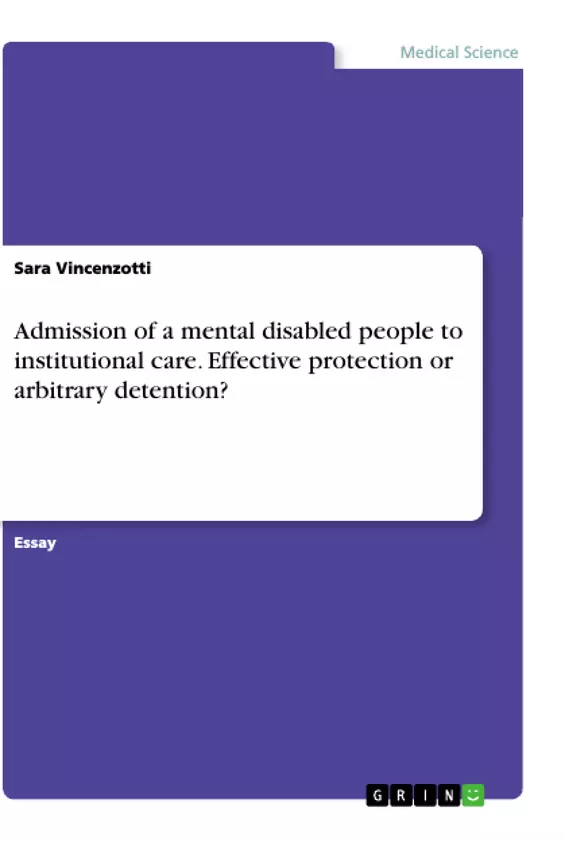The aim of this essay is to critically evaluate the development of procedural safeguards regarding deprivation of incapacitated patients’ liberty in institutional care. It will assess the extent to which the law is successful in protecting patients’ rights against arbitrary detention, and led to the conclusion that neither the past law nor the current law have adequately safeguarded people’s rights against arbitrary detainment.
To do so, it will start by evaluating the development of the protection of liberty frameworks in the UK, and how their inadequacy led to the implementation of DOLS in hospitals and care homes. Consequently, there will be an evaluation of three main criticisms. Firstly, it will look at the level of complexity of DOLS, both on a politico-legal plane and on a practical medical plane. Secondly, it will look at what is held to constitute as a deprivation of liberty, and how there are significant gaps in this definition.
Thirdly, it will take a closer look at the implications of the Cheshire West judgment and evaluate the consequences of broadening the scope for DOLS. This essay will thus reach the conclusion that the law relating to the admission of incapacitated patients has failed to properly assess individuals’ rights to protection from arbitrary detention.
Inhaltsverzeichnis (Table of Contents)
- Introduction
- Development of the Protection of Liberty Framework
- The Mental Capacity Act 2005 (MCA)
- The Mental Health Act 1983 (MHA)
- The Bournewood Gap
- The European Court of Human Rights (ECtHR)
- MCA 2005 and the Deprivation of Liberty Safeguards
Zielsetzung und Themenschwerpunkte (Objectives and Key Themes)
This essay aims to analyze the development of procedural safeguards for the deprivation of liberty of incapacitated patients in institutional care in the UK. The essay examines the effectiveness of legal frameworks in safeguarding patients' rights against arbitrary detention and ultimately argues that neither past nor current legislation has adequately addressed this concern.
- The evolution of legal frameworks for protecting liberty in the UK, focusing on the Mental Capacity Act 2005 (MCA) and the Mental Health Act 1983 (MHA).
- The significance of the "Bournewood gap" and its impact on the protection of incapacitated patients' rights.
- The introduction of Deprivation of Liberty Safeguards (DOLS) under the MCA 2005 and their effectiveness in addressing the issue of arbitrary detention.
- Criticisms of the DOLS framework, including its complexity, limitations in defining deprivation of liberty, and the implications of the Cheshire West judgment.
- The essay's central argument: the law relating to the admission of incapacitated patients has failed to effectively safeguard their right to protection from arbitrary detention.
Zusammenfassung der Kapitel (Chapter Summaries)
The introduction sets out the essay's aim, which is to critically evaluate the development of procedural safeguards regarding the deprivation of incapacitated patients' liberty in institutional care. The essay will assess the extent to which the law is successful in protecting patients' rights against arbitrary detention, and led to the conclusion that neither the past law nor the current law have adequately safeguarded people's rights against arbitrary detainment.
The second chapter explores the development of the protection of liberty frameworks in the UK, examining the Mental Capacity Act 2005 (MCA) and the Mental Health Act 1983 (MHA). The chapter also discusses the case of HL v The United Kingdom, which highlighted the inadequacy of existing legal frameworks and led to the implementation of DOLS.
The third chapter focuses on the Deprivation of Liberty Safeguards (DOLS) introduced under the MCA 2005. It examines the framework's six categories, which must be satisfied to obtain authorization for deprivation of liberty, and discusses the criticisms leveled at the system, including its complexity, limitations in defining deprivation of liberty, and the implications of the Cheshire West judgment.
Schlüsselwörter (Keywords)
The main keywords and focus topics of this essay include: mental capacity, deprivation of liberty, arbitrary detention, procedural safeguards, Mental Capacity Act 2005 (MCA), Mental Health Act 1983 (MHA), Deprivation of Liberty Safeguards (DOLS), Cheshire West judgment, best interest test, Winterwerp criteria, European Convention of Human Rights (ECHR), human rights, and institutional care.
Frequently Asked Questions
What are Deprivation of Liberty Safeguards (DOLS)?
DOLS are procedural safeguards in the UK designed to protect incapacitated patients in hospitals or care homes from being detained arbitrarily, ensuring any restriction of liberty is in their best interest.
What was the "Bournewood Gap"?
It refers to a legal loophole where incapacitated patients who did not resist treatment could be detained without the formal protections of the Mental Health Act, a practice later ruled unlawful by the ECtHR.
What did the Cheshire West judgment change?
The Supreme Court judgment significantly broadened the definition of "deprivation of liberty," stating that even if a person is comfortable, they are deprived of liberty if they are under continuous supervision and not free to leave.
How does the Mental Capacity Act 2005 relate to detention?
The MCA 2005 provides the legal framework for making decisions on behalf of people who lack capacity, including the authorization of DOLS when detention is necessary for their care.
What are the main criticisms of the current DOLS framework?
Critics point to the extreme complexity of the system, the significant administrative burden on medical staff, and the failure to adequately protect individual rights despite the safeguards.
- Arbeit zitieren
- Sara Vincenzotti (Autor:in), 2020, Admission of a mental disabled people to institutional care. Effective protection or arbitrary detention?, München, GRIN Verlag, https://www.grin.com/document/900993



